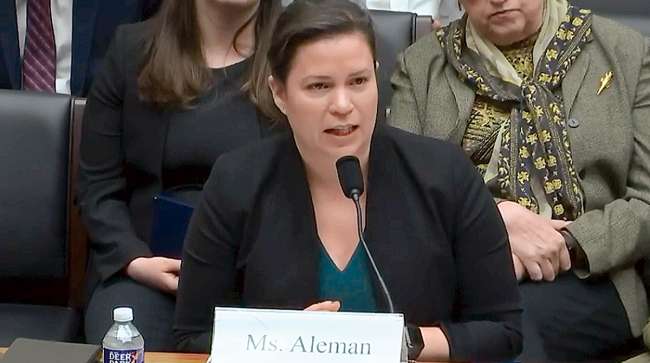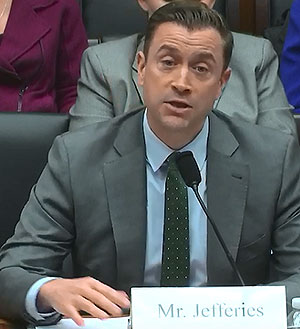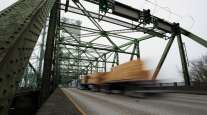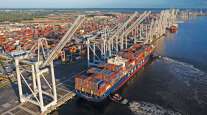Senior Reporter
Enhance Freight Connectivity in Next Highway Bill, Executives Tell US House Panel

[Stay on top of transportation news: Get TTNews in your inbox.]
Consideration in Congress of an extensive update to federal transportation guidelines must prioritize sustainable funding that enhances freight connectivity and reduces congestion, industry stakeholders told lawmakers on Capitol Hill on Dec. 5.
Absent proposals in the next comprehensive highway bill that target improving the nation’s infrastructure, freight mobility could experience disruptions, executives representing freight rail, state transportation agencies and prominent sectors warned members on the House Transportation and Infrastructure Committee. Online consumer spending and a growing population are contributing factors to congestion across metropolitan regions, they asserted.
“Our nation’s ability to move goods safely, reliably and expeditiously keeps U.S. businesses competitive in the global marketplace and supports a higher standard of living for all,” said Erin Aleman, executive director of the Chicago Metropolitan Agency for Planning. She represented the Coalition for America’s Gateways and Trade Corridors. “I urge you to make a robust freight program the hallmark of this upcoming reauthorization.”

Jim Tymon by House Transportation & Infrastructure Committee via YouTube
Jim Tymon with the American Association of State Highway and Transportation Officials proposed lawmakers consider expanding the Primary Highway Freight System and National Multimodal Freight Network in the next major highway bill.
“Since states are required to complete state freight plans, which must then be approved by [the U.S. Department of Transportation], a framework exists to identify and define the appropriate freight network in any given state,” he said.
Tymon also urged lawmakers to guarantee the long-term solvency of the dwindling Highway Trust Fund, an account that assists states with projects. The fund falls under the jurisdiction of the congressional tax-writing committees, which have yet to propose fixes to the account.
“The lack of stable, predictable funding from the Highway Trust Fund makes it nearly impossible for state [departments of transportation] to plan for large projects that need a reliable flow of funding over multiple years. And these projects are what connect people, enhance quality of life and stimulate economic growth in each community where they are built,” Tymon added.

Ian Jefferies by House Transportation & Infrastructure Committee via YouTube
To that point, Ian Jefferies, CEO of the Association of American Railroads, also called for an assurance of sustainability for the trust fund. AAR opposes increasing taxes or fees on freight railroads pertaining to the fund. Instead, the group pointed to increasing the fuel tax, a fee on miles traveled via vehicles or a weight-distance tax.
“The freight railroad industry supports funding for grant programs that enable the public sector, including state and local governments and passenger and commuter railroads, to partner with freight railroads to advance projects of mutual interest, including projects to help lessen road and port congestion, enhance safety at highway-rail grade crossings, improve port connectivity, facilitate intercity passenger and commuter rail service, and improve the quality of life for communities,” Jefferies said.
Additionally, Chuck Baker, president of the American Short Line and Regional Railroad Association, expressed support for a freight-centric grants program established in the 2015 FAST Act. “There is value in a merit-based discretionary grant program open to multiple modes of transportation, especially one that is focused on freight and goods movement,” Baker said.
Transportation and Infrastructure Chairman Peter DeFazio (D-Ore.) acknowledged a need to enhance connectivity across freight systems and signaled potential for proposing additional funding availability for freight projects. He described freight-centric programs established by the FAST Act as “dramatically oversubscribed.”
“This points to a significant need for greater funding to be made available for freight projects,” DeFazio said. “It also underscores that Congress needs to enact tighter rules around grant allocations to ensure the most worthy projects are funded, which I intend to look at in reauthorization.”
Agreeing on a sustainable source of funding for highway programs remains a challenge for federal lawmakers. The trust fund relies on insufficient revenue from the federal tax on gas (18.4 cents per gallon) and diesel (24.4 cents per gallon). Those rates were set in 1993.
To help address freight concerns nationwide, the U.S. Department of Transportation established the Infrastructure For Rebuilding America, or INFRA, grants program.
Also at the hearing, California Rep. Doug LaMalfa (R) drew attention to legislation he is sponsoring that would repeal the 12% federal excise tax on certain heavy-duty trucks, tractors and trailers. On average, the excise tax at the federal level has the potential to add $12,000 to $22,000 to the sale of a new truck, explain supporters of the bill.
Want more news? Listen to today's daily briefing:




